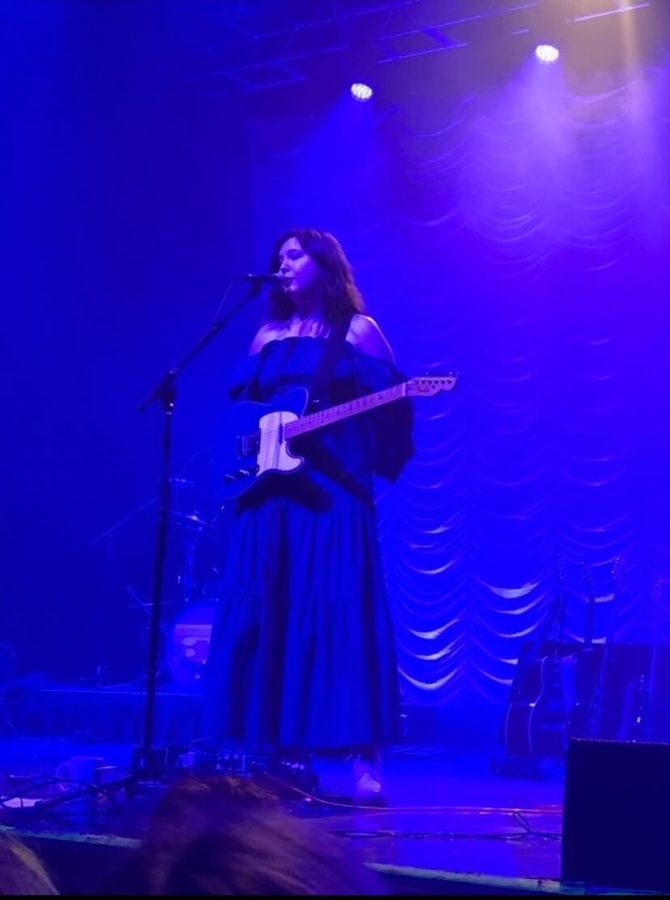Review: Lucy Dacus plays House of Blues Boston
Lucy Dacus onstage at House of Blues Boston.
October 25, 2021
“Who does Lucy Dacus make music for?” my roommate asked me when I invited her to attend the Lucy Dacus concert with me.
“Young queer people who grew up in the church,” I responded, basing my generalization on the themes of religion and sexual repression that prevail in Dacus’s third studio album Home Video, released this past June with Matador Records. The concert I attended at House of Blues Boston Oct. 16 proved my suspicions correct: dozens of tattooed, ring-clad hands went up when Dacus playfully asked the audience whether they had been to Vacation Bible School as a lead-in to her song of the same title. Despite the somewhat niche target demographic, Dacus played a full house and proved to be quite versatile as a performer.
Up-and-coming indie rock artist Bartees Strange opened the show with an electric nine-song set that showcased the band’s high-energy performance style. Bartees Strange, born as Bartees Leon Cox Jr., has a distinctive sound that flirts with elements of rap, rock and folk to express his experiences as a Black man in a predominantly white space. Strange and his band were completely at home on stage, taking up all available space with free-flowing dance moves and teasing the audience by starting a round of metronomic clapping before shushing the crowd with a wink.
Bartees Strange was fairly unknown to the audience but overall well-received; the excitable crowd let out hearty cheers whenever Strange belted out a high note or a crescendoing riff.
“I’ve only played in Boston twice. The last time it was in a basement with, like, 13 people. I like this show better,” Strange said between songs, pleased at the size and enthusiasm of the audience. Needless to say, Bartees Strange won many new listeners that night with his contagious zest and powerful music.
After Bartees Strange left the stage, a small screen began displaying home videos from Lucy Dacus’s childhood on loop, showing Dacus expressing a love of performing from a young age. Home Video, Dacus’s newest release, is a record full of nostalgia and depictions of quintessential coming of age experiences. The physical image of Dacus’s chubby baby fingers clutching a toy microphone transitioning into a 26-year-old Dacus striding onstage to deafening cheers set the mood for the night. Eager screams of excitement from the audience nearly drowned out her voice, as clear as rich as it sounds on the record.
Rather than choosing to open with a catchy crowd pleaser, Lucy Dacus started slow with “Triple Dog Dare,” a poignant eight-minute folk ballad telling the story of two girls who decide to run away together after a conservative mother attempts to keep them apart. She followed this tear-jerker up with several more fast-paced, upbeat songs before returning to her angsty roots with “Christine,” another soulful song about a repressed homoerotic friendship between two girls from religious backgrounds.
Dacus continued this pattern of switching between her most depressing songs and her more danceable beats as the set progressed, presumably for the emotional stability of the audience (one fan could be heard violently sobbing and choking on their own tears during “Thumbs,” a song in which Dacus accompanies her partner to a reunion with her estranged father). Before her last song of the set, Dacus thanked the audience for their continued support through the pandemic and said, “I can’t see your mouths but I can hear you singing, and that makes me the happiest person ever.”
After closing with “Night Shift,” a melancholic song about the transience of romantic relationships and Dacus’s most popular song to date, Lucy Dacus was pulled back onto the stage with ear-splitting demands for an encore.
“That was wild. Y’all are feral… in a good way,” Dacus said of the standing ovation.
She played a spirited cover of Bruce Springsteen’s “Dancing in the Dark” before dropping a bombshell: She was going to play an unreleased song that she had been working on. Amid exclamations of disbelief and anticipation, Dacus asked that no one record for fear of the song being leaked early. Dacus’ new song, a gorgeous acoustic piece with wistful lyrics conveying deep yearning and regret followed, fitting well with the central themes of Home Video and ending the night with an unexpected and welcome treat.
Hit with a wave of post-concert depression, I once again contemplated the question of who Lucy Dacus makes music for. Although I automatically designated songs like “Christine” and “VBS” which represent themes of religious trauma and internalized homophobia as the defining ideas of Dacus’s discography, many of her songs about growing up and feeling simultaneously isolated from and inextricably connected to your past are universal. Everyone in House of Blues felt the bittersweet nostalgia of Lucy Dacus’s smooth voice and reverberating guitar strings in their bones, and hopefully left reflecting on their personal growth — and streaming Home Video.












